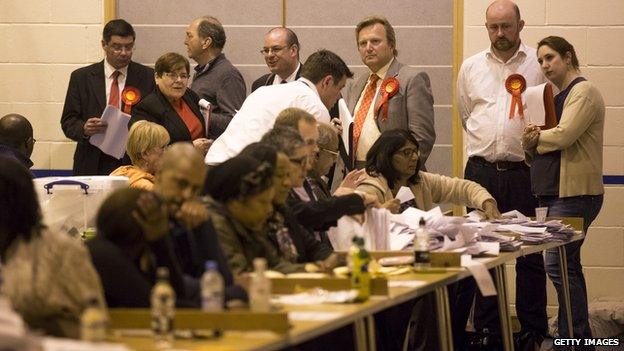European elections: Cameron's opening
- Published

Vote count in Croydon, England: The election may boost reformers' case in EU
It is presumed that European election night (Sunday) will be a bad one for David Cameron. Perhaps the ignominy of a third place.
There will be inevitable speculation as to whether Europe will dog him all the way to the general election in May of next year. Yet, in some respects, this result could be an opening for him.
Already there are the first stirrings of a post-election debate. Take note of recent comments by Netherlands Prime Minister Mark Rutte and Christian Lindner of the German liberal FDP.
In a they complain of "a thicket of European legislation that has emerged over the years". They write of the need to reduce the EU's powers to "core areas". And they argue that "it is important to strengthen the influence of national parliaments".
Sarkozy steps in
Yes, Mr Rutte is already a Cameron ally, but then stir in comments by Nicolas Sarkozy. and Die Welt the former French president says "we need to look at today's EU with clarity.
"It can't work at 28 (members) as it did at six, nine or even 12. I sincerely believe that there will be no alternative to a drastic reduction of the extent of the EU's powers." He envisages at least half of the EU's powers being handed back to the member states. He rails against pointless EU directives and suggests suspending Schengen, which guarantees free movement within the EU.
Potentially this is more significant than the in/out debate. The reformers sniff opportunity and on Sunday night, as the results come in, their case might gain traction. Here's what to look for:
Firstly, turnout. Five years ago it was 43%. If it falls further or does not significantly improve - despite all the efforts to engage voters - the new European Parliament will be stripped of some of its legitimacy.
This time round MEPs believed they were extending democracy by telling voters that the candidate of the biggest bloc in the parliament would get the EU's top job - President of the Commission.
Now the two leading candidates - Jean-Claude Juncker and Martin Schulz - have been indefatigable campaigners. They have regularly debated and yet there is scant evidence that any of this has caught the attention of Europe's voters. If confirmed at the ballot box there is bound to be an inquest.
(It is in any event a curious, hybrid campaign, where voters are told that by voting for one institution it will settle the leadership of another.)
Vote 2014
Rethinking EU project
There is a great restlessness at the heart of the EU at the moment. Officials will be further troubled if they have failed to engage the European voter.
Everywhere you look is evidence of stress. To take just one example: the French political elite is "deeply uncomfortable" with the eurozone and the growing influence of Germany. It prompted a British insider to describe the mood as quite "helpful for us" at the moment. Why? The future shape of the EU is very much in play.
The second test will be the size of the anti-establishment vote. If a quarter of voters back what are mainly Eurosceptic parties that would be significant in itself. But say that figure reaches higher. It would begin to suggest that alienation runs deeper than resentment at austerity and unemployment.
It would be wise to be cautious, however. In the Netherlands - the one European country apart from the UK to have voted so far - the supporters of Geert Wilders, the controversial anti-immigrant, anti-Brussels politician, seemed to think they had under-performed, although the results won't be known until Sunday.
But if the anti-establishment vote is high then reformers will spy the chance to argue that the EU needs saving from itself. It will be a tough argument, with the outcome uncertain, but I suspect it will be had. Why tough? Because closer integration is not just in the treaties, but it is in the DNA of a generation of officials and European leaders.
New allies for UK?
The temptation will be to circle the wagons. But other voices will insist it is time to redesign the architecture, to question the mantra of deeper integration being the answer to every problem.
A different vision might involve an enhanced role for national parliaments; it might envisage an EU that does less, but better.
The ever-closer-union crowd are happy to debate the sceptics - but they might find their real argument lies with reformers.
So potentially Sunday night's results will be of great significance. As the think tank Open Europe observed, "it should be clear by now that David Cameron could find allies in France". He might discover them elsewhere, but only if he makes the case for reforming the EU and not arguing for special treatment for the UK.
For David Cameron his chance to strike a better deal for the UK might just come sooner than after 2015.